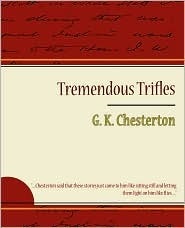What do you think?
Rate this book


144 pages, Paperback
First published January 1, 1909
Being a nation means standing up to your equals, whereas being an empire only means kicking your inferiors.
---
Folk-lore means that the soul is sane, but that the universe is wild and full of marvels. Realism means that the world is dull and full of routine, but that the soul is sick and screaming. The problem of the fairy tale is - what will a healthy man do with a fantastic world? The problem of the modern novel is - what will a madman do with a dull world? In the fairy tale the cosmos goes mad; but the hero does not go mad. In the modern novels the hero is mad before the book begins, and suffers from the harsh steadiness and cruel sanity of the cosmos.
---
Fairy tales, then, are not responsible for producing in children fear, or any of the shapes of fear; fairy tales do not give the child the idea of the evil or the ugly; that is in the child already, because it is in the world already. Fairy tales do not give a child his first idea of bogey. What fairy tales give the child is his first clear idea of the possible defeat of bogey. The baby has known the dragon intimately ever since he had an imagination. What the fairy tale provides for him is a St. George to kill the dragon.
I find that there really are human beings who think fairy tales bad for children. I do not speak of the man in the green tie, for him I can never count truly human. But a lady has written me an earnest letter saying that fairy tales ought not to be taught to children even if they are true. She says that it is cruel to tell children fairy tales, because it frightens them. You might just as well say that it is cruel to give girls sentimental novels because it makes them cry. All this kind of talk is based on that complete forgetting of what a child is like which has been the firm foundation of so many educational schemes. If you keep bogies and goblins away from children they would make them up for themselves. One small child in the dark can invent more hells than Swedenborg. One small child can imagine monsters too big and black to get into any picture, and give them names too unearthly and cacophonous to have occurred in the cries of any lunatic. The child, to begin with, commonly likes horrors, and he continues to indulge in them even when he does not like them. There is just as much difficulty in saying exactly where pure pain begins in his case, as there is in ours when we walk of our own free will into the torture-chamber of a great tragedy. The fear does not come from fairy tales; the fear comes from the universe of the soul.Actually, most of the essays are wonderful -- and just the thing to make you feel better if you are down in the dumps. In fact, if you have not previously read Chesterton, I recommend Tremendous Trifles as a good place to start reading his voluminous work.
